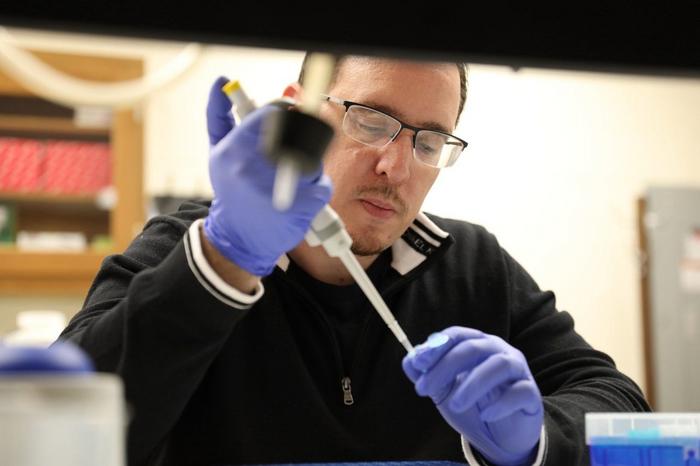About 40 percent of people over age 65 suffer some form of age-related memory loss, which puts them at higher risk for developing dementia and Alzheimer’s disease. However, there are currently no approved methods for preventing memory loss with age.

Credit: Photo by Max Esterhuizen for Virginia Tech.
About 40 percent of people over age 65 suffer some form of age-related memory loss, which puts them at higher risk for developing dementia and Alzheimer’s disease. However, there are currently no approved methods for preventing memory loss with age.
Tim Jarome, associate professor of neurobiology in the Virginia Tech College of Agriculture and Life Sciences’ School of Animal Sciences is hoping to change that, aided by a $433,000 grant from the National Institute on Aging, which is part of the National Institutes of Health.
Jarome and his research partner, Assistant Professor Sydney Trask of Purdue University’s Department of Psychological Sciences, aim to manipulate a protein complex called the proteasome in the hippocampus region of the brain to determine its role in memory loss.
“We’ve known for quite some time that proteasome function decreases over a person’s lifespan and that it’s likely related to memory loss, but it’s never been directly shown because no one’s been able to manipulate the proteasome,” Jarome said.
Using a gene-editing tool called CRISPR-Cas9, Jarome and his team have been the first researchers to successfully stimulate the proteasome within the hippocampus. In the next phase of their research, they will manipulate the proteasome to determine whether it can be increased to prevent and restore age-related memory loss.
“We hope this project will significantly advance our understanding of how proteasome dysfunction contributes to age-related cognitive decline,” Jarome said. “If successful, it has the potential to contribute to the development of novel therapeutic strategies to prevent or reverse memory loss associated with age and age-associated neurodegenerative disorders that impact the hippocampus.”
Their work carries significance for understanding and treating not only memory loss from natural aging but also degenerative brain diseases such as Alzheimer’s and dementia, which affect more than 10 percent of Americans over age 65.
“We hope this research will yield the first connection between proteasome dysfunction with age and memory loss with age and that we’ll be able to show that by controlling the proteasome we can control memory with age,” Jarome said. “If we can fix this one mechanism, we might be able to fix a lot of the things that are going wrong as we age that contribute to memory loss with age. It gives us a therapeutic target we can start to develop strategies around to stimulate and, hopefully, improve memory across the lifespan.”




